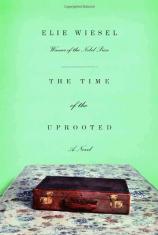The Time of the Uprooted
Review
The Time of the Uprooted
Elie Wiesel's THE TIME OF THE UPROOTED shouldn't work. With its sudden shifts in point of view, disturbingly eloquent children, truncated storylines and generally convoluted, if scanty, plot, the book should be a disappointment. But the Nobel Prize winner's meditation on despair and hope in the face of both the unthinkable and the mundane is deeply moving.
Wiesel (and his translator, David Hapgood) skillfully controls the mood of the work, immersing the reader in the sadness of Gamaliel Friedman, a man whose life has been a series of struggles. A childhood spent in hiding from the Nazis and an adulthood spent in unhappy romances have left Gamaliel irreparably harmed.
Spiritual issues are pervasive in this book. A ghostwriter, Gamaliel is at work on a story of his own centered on a conflict between a rabbi and a priest. He is also enamored of a rabbi seeking to force the arrival of the Messiah. And he is preoccupied with a woman, near death, who he imagines might be the woman who protected him as a child. Each interlocking piece of his life adds heft to the book's spiritual themes.
Gamaliel's relationships with women, central to the story, are almost cursorily described. Each seems a rich vein of material that Wiesel barely mines. Indeed, the same could be said of many of the plot points.
THE TIME OF THE UPROOTED often feels like a slimmed down version of a potentially more ornately layered tale. Ultimately, however, Wiesel stirs the reader's emotions with economy and power.
Reviewed by Rob Cline (rob__cline@hotmail.com) on January 23, 2011
The Time of the Uprooted
- Publication Date: August 9, 2005
- Genres: Fiction
- Hardcover: 320 pages
- Publisher: Knopf
- ISBN-10: 1400041724
- ISBN-13: 9781400041725





